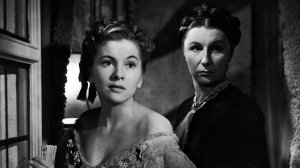Rebecca
The shadow of this woman darkened their love
Rebecca is never shown, you never hear her voice, yet she's everywhere. Not only was Rebecca Alfred Hitchcock's first American project but also the winner of his only Best Picture Oscar.
Hitchcock's romantic suspense thriller proves to be one of the most gripping and tangling movies of his career. A happy-go-lucky beginning quickly turns into a film that touches themes of suicide, lesbianism, incestuous relationships and murder.
The story entails a naive young woman (Fontaine) who meets an older widower (Olivier) on the Riviera and hastily marries him. But when she returns with her new husband to his estate in England, she runs up against a housekeeper who is obsessed with making the memory of the landowner's late wife Rebecca the presiding influence on the household. As the mystery surrounding Rebecca's death gradually unravels, the new bride is driven to the edge of despair.
Manderley, the mansion here, is one of the finest put on the screen; this is because Hitchcock and his cinematographer George Barnes manage to make it switch scene to scene from bold & beautiful to a monolithic nightmare. It's wonderful case of the surroundings playing the extra character for optimal effect.
Laurence Olivier is impressive, even if we would learn later on that this is the sort of performance he could do in his sleep. The supporting cast are fantastic too; especially the cold and terrifying turn from Judith Anderson as Mrs Danvers. However, this will always be Joan Fontaine's show, she nails it perfectly, the new Mrs De Winter wants to do right, but can never seem to do so. She infuriates at times, yet the next minute she grabs hold of our empathy with her alluring vulnerability. It’s brilliant performance in a hauntingly beautiful Gothic film that is produced with consummate skill.
Raghav Bali
More Information | Back to Previous Schedule | This Season | BBFC Classification Guidelines
Screenings of this film:
| 2012/2013 Spring Term – (digital) |



